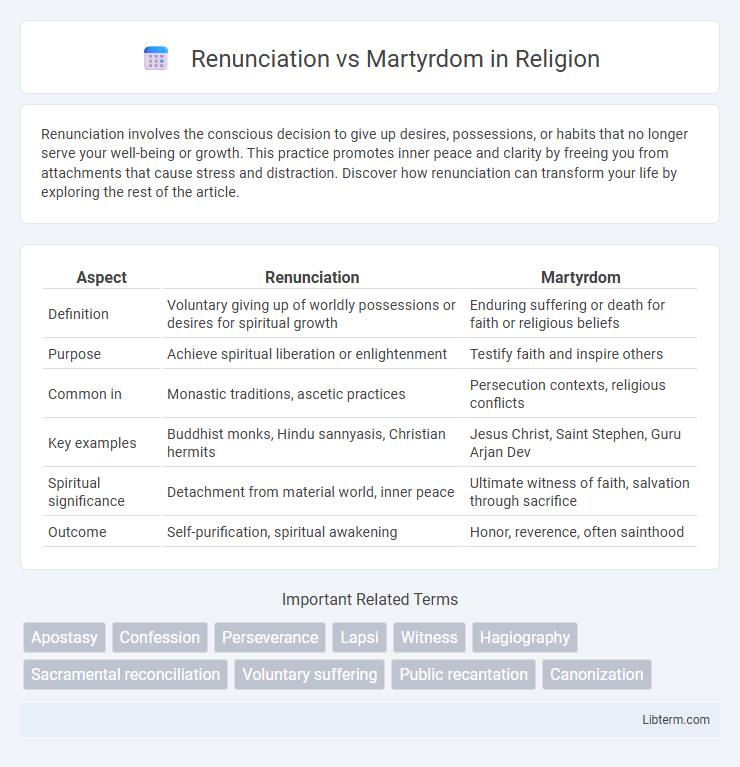Renunciation involves the conscious decision to give up desires, possessions, or habits that no longer serve your well-being or growth. This practice promotes inner peace and clarity by freeing you from attachments that cause stress and distraction. Discover how renunciation can transform your life by exploring the rest of the article.
Table of Comparison
| Aspect | Renunciation | Martyrdom |
|---|---|---|
| Definition | Voluntary giving up of worldly possessions or desires for spiritual growth | Enduring suffering or death for faith or religious beliefs |
| Purpose | Achieve spiritual liberation or enlightenment | Testify faith and inspire others |
| Common in | Monastic traditions, ascetic practices | Persecution contexts, religious conflicts |
| Key examples | Buddhist monks, Hindu sannyasis, Christian hermits | Jesus Christ, Saint Stephen, Guru Arjan Dev |
| Spiritual significance | Detachment from material world, inner peace | Ultimate witness of faith, salvation through sacrifice |
| Outcome | Self-purification, spiritual awakening | Honor, reverence, often sainthood |
Defining Renunciation: Letting Go for a Greater Purpose
Renunciation involves consciously surrendering material possessions, desires, or personal ambitions to achieve spiritual growth or a higher purpose. This deliberate act of letting go fosters inner peace, self-discipline, and a profound connection to universal values beyond individual ego. Unlike martyrdom, which entails sacrifice through suffering or death for a cause, renunciation emphasizes voluntary detachment as a transformative path toward enlightenment or moral clarity.
Martyrdom: Sacrifice and Its Symbolism
Martyrdom embodies the ultimate sacrifice, symbolizing unwavering faith and moral conviction in the face of persecution or death. This act of self-sacrifice transcends personal loss, becoming a powerful emblem of resistance and inspiration within religious and cultural narratives. Martyrs often serve as catalysts for social change, their stories immortalized as testament to enduring principles and collective identity.
Historical Contexts of Renunciation and Martyrdom
Renunciation and martyrdom have played pivotal roles in shaping religious and cultural histories across civilizations, with renunciation often associated with spiritual withdrawal in traditions like Hinduism and Buddhism, where individuals forsake worldly life to attain enlightenment. Martyrdom, prominently found in early Christianity, Islam, and Sikhism, involves enduring suffering or death for steadfast adherence to faith or principles, symbolizing ultimate devotion and resistance against oppression. Historically, renunciation served as a transformative personal journey, while martyrdom functioned as a powerful collective narrative fostering communal identity and inspiring social or religious movements.
Psychological Motivations Behind Renunciation
Psychological motivations behind renunciation often involve a profound quest for inner peace, self-control, and detachment from worldly desires, reflecting a deliberate choice to transcend material attachments. Renunciants typically seek spiritual growth through voluntary simplicity and withdrawal, driven by intrinsic values rather than external validation. This contrasts with martyrdom, where the psychological impetus is rooted in conviction and sacrifice for a cause, often involving confrontation or suffering imposed by others.
The Role of Faith in Martyrdom
Faith serves as the foundational pillar in martyrdom, motivating individuals to endure suffering and death rather than renounce their beliefs, thereby embodying ultimate religious devotion. Martyrs often view their sacrifice as a testament to the truth and power of their faith, inspiring communal solidarity and spiritual resilience among followers. The unwavering trust in divine justice and eternal rewards reinforces the role of faith as an essential element in transforming martyrdom into a profound act of sacred commitment.
Renunciation in Eastern and Western Philosophies
Renunciation in Eastern philosophies often emphasizes the deliberate withdrawal from worldly desires and material attachments to achieve spiritual liberation, as seen in Hinduism's ascetic practices and Buddhism's path to enlightenment. Western philosophies typically interpret renunciation more as a moral or ethical decision to forgo personal gain or pleasures in pursuit of higher virtues, exemplified by Christian monastic traditions and Stoic self-discipline. Both traditions regard renunciation as a transformative act that fosters inner clarity and transcendence beyond immediate physical or emotional inclinations.
Societal Impact of Martyrs
Martyrdom significantly influences societal values by inspiring collective resilience and fostering a shared identity centered around sacrifice and moral conviction. Martyrs often become symbols of resistance against oppression, galvanizing social movements and prompting legislative or cultural transformations. The reverence for martyrs cultivates a legacy that motivates communities to uphold justice and human rights despite ongoing challenges.
Renunciation vs Martyrdom: Ethical Considerations
Renunciation involves voluntarily giving up personal desires or possessions to achieve spiritual or ethical goals, emphasizing self-discipline and inner transformation. Martyrdom is the act of enduring suffering or death for a principled stand or faith, highlighting sacrifice and moral witness in the face of injustice. Ethical considerations between renunciation and martyrdom center on intent, autonomy, and the impact of these acts on both individual integrity and societal values.
Modern Examples of Renunciation and Martyrdom
Modern examples of renunciation include figures like Malala Yousafzai, who gave up a normal life to advocate for girls' education despite threats, and Greta Thunberg, who renounced comfortable living to pursue climate activism. Martyrdom is exemplified by individuals such as Jamal Khashoggi, whose assassination highlighted his sacrifice for freedom of speech, and the 2019 Hong Kong pro-democracy protesters, many of whom faced imprisonment or death for their cause. These cases illustrate ongoing global struggles where personal sacrifice underscores the fight for human rights and justice.
Choosing Between Renunciation and Martyrdom: Implications for Personal Growth
Choosing between renunciation and martyrdom profoundly influences personal growth by shaping individual values and long-term resilience. Renunciation often fosters inner peace and detachment, encouraging self-awareness and spiritual development, while martyrdom emphasizes sacrifice and commitment to a cause, strengthening resolve and moral courage. Both paths challenge personal identity and priorities, driving profound transformation through introspection and lived experience.
Renunciation Infographic

 libterm.com
libterm.com